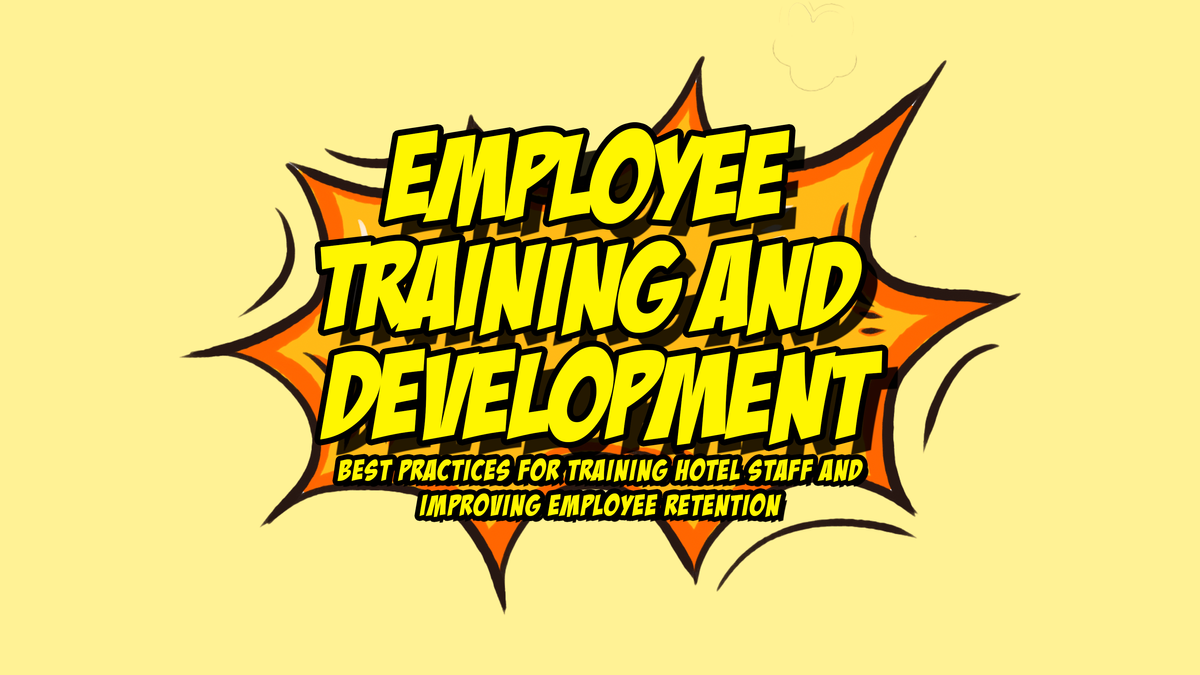In the hospitality industry, where service quality is important, well-trained and motivated employees are the cornerstone of success. Investing in employee training and development not only enhances service delivery but also plays a crucial role in improving employee retention. This discussion explores best practices for training hotel staff and strategies to boost employee retention, ultimately contributing to a hotel's long-term success.
The Importance of Employee Training and Development
Effective training and development programs equip hotel staff with the skills and knowledge necessary to provide exceptional service. These programs also foster a culture of continuous improvement and professional growth. The most important benefits are as follows;
Enhanced Service Quality
Well-trained employees are more competent and confident in delivering high-quality service. Enhanced service quality is a direct result of investing in employee training and development. When employees are well-trained, they possess the skills and knowledge necessary to perform their duties effectively and efficiently. This competence translates into higher confidence, enabling them to deliver exceptional service consistently. As they master their roles, they can better anticipate and meet customer needs, leading to greater customer satisfaction and a stronger overall service experience.
Increased Job Satisfaction
Providing development opportunities boosts job satisfaction and morale. In addition to service quality, job satisfaction is significantly improved when employees are provided with opportunities for growth and development. When organizations invest in their employees' learning and career advancement, it not only enhances their skills but also shows that the company values their contributions. This recognition fosters a sense of purpose and fulfillment, leading to higher morale and job satisfaction. Employees who feel supported and appreciated are more likely to be engaged, motivated, and committed to their work.
Improved Employee Retention
Investing in employees' growth and career advancement reduces turnover rates and associated costs. Moreover, the impact of investing in employee development extends to employee retention. By offering career advancement opportunities and fostering a culture of growth, organizations can reduce turnover rates. Employees are more likely to stay with a company that invests in their professional development, as they see a clear path for growth and a long-term future within the organization. This stability reduces the costs associated with hiring and training new employees, ultimately contributing to a more stable and productive workforce.
Best Practices for Training Hotel Staff
Conduct Comprehensive Onboarding
A well-structured onboarding program is critical for new hires. It helps them acclimate to the hotel's culture, understand their roles, and perform effectively from the start.
Welcome Orientation: Introduce new employees to the hotel's mission, values, and organizational structure. Provide an overview of key policies and procedures.
Departmental Training: Departmental training plays a crucial role in ensuring that new hires are fully equipped to perform their specific roles effectively and contribute to the overall success of the organization. By offering training that is tailored to each department, companies can provide employees with a deep understanding of their specific duties, the tools and processes they will use, and the standards they must uphold. This focused approach ensures that employees not only know what is expected of them but also how their responsibilities align with the broader goals of the company. For example, in a hospitality setting, the training provided to housekeeping staff will differ significantly from that given to front desk personnel or food and beverage teams. Each department has unique tasks and interactions that require specialized knowledge and skills. Departmental training helps new hires understand the nuances of their roles, such as how their work impacts guest satisfaction, safety, and overall experience. By understanding their department's contribution to the guest experience, employees are more likely to take pride in their work and feel a stronger connection to the organization’s mission.
Mentorship Programs: Pair new employees with experienced mentors who can provide guidance, support, and real-world insights.
Implement Continuous Learning Programs
Continuous learning fosters a culture of growth and development. Regular training sessions keep employees updated on industry trends, new technologies, and best practices.
Workshops and Seminars: Organize workshops and seminars on relevant topics such as customer service, hospitality trends, and operational efficiency.
E-Learning Platforms: Use online learning platforms to offer flexible and accessible training modules that employees can complete at their own pace.
Cross-Training: Encourage cross-training to help employees understand different roles and responsibilities within the hotel, promoting teamwork and operational flexibility.
Focus on Soft Skills Development
In the hospitality industry, soft skills are as important as technical skills. Training programs should emphasize on them, they are for example;
Communication Skills: Teach effective communication techniques to enhance interactions with guests and colleagues.
Customer Service Excellence: Provide training on handling guest inquiries, resolving complaints, and exceeding guest expectations.
Problem-Solving and Decision-Making: Equip employees with strategies to address and resolve issues promptly and effectively.
Leverage Technology for Training
Technology can enhance training programs by making them more interactive and engaging.
Virtual Reality (VR) Training: Use VR simulations to create realistic scenarios where employees can practice skills in a safe environment.
Interactive Training Modules: Develop interactive online modules that include quizzes, videos, and practical exercises to reinforce learning.
Mobile Learning Apps: Offer mobile-friendly training content that employees can access anytime, anywhere.
Provide Leadership Development Opportunities
Investing in leadership development prepares employees for higher responsibilities and promotes internal career advancement.
Leadership Workshops: Conduct workshops focused on leadership skills, team management, and strategic thinking.
Management Trainee Programs: Create programs that identify high-potential employees and provide them with the training and experiences needed to assume managerial roles.
Succession Planning: Develop succession plans to ensure a pipeline of qualified leaders for key positions within the hotel.
Strategies to Improve Employee Retention
Create a Positive Work Environment
A supportive and positive work environment is crucial for employee satisfaction and retention.
Recognition and Rewards: Implement recognition programs to celebrate employee achievements and contributions. Offer rewards such as bonuses, gift cards, and additional time off.
Open Communication: Foster an open-door policy where employees feel comfortable sharing ideas, concerns, and feedback with management.
Team Building Activities: Organize team-building activities to strengthen relationships, enhance collaboration, and boost morale.
Offer Competitive Compensation and Benefits
Providing attractive compensation and benefits is essential to retain top talent.
Competitive Salaries: Regularly review and adjust salaries to ensure they are competitive within the industry and region.
Comprehensive Benefits: Offer a comprehensive benefits package that includes health insurance, retirement plans, and wellness programs.
Professional Development Support: Provide financial assistance for employees pursuing further education or professional certifications.
Foster Career Growth and Advancement
Employees are more likely to stay with a company that offers clear career growth and advancement opportunities.
Career Pathing: Develop clear career paths for different roles within the hotel, outlining potential advancement opportunities.
Regular Performance Reviews: Conduct regular performance reviews to discuss career aspirations, provide constructive feedback, and set goals for professional development.
Internal Promotions: Prioritize internal promotions to reward loyal employees and demonstrate the hotel's commitment to their growth.
Support Work-Life Balance
Promoting work-life balance is crucial for employee well-being and retention.
Flexible Scheduling: Offer flexible work schedules to accommodate employees' personal needs and preferences.
Paid Time Off: Provide generous paid time off policies to ensure employees have time to rest and recharge.
Employee Assistance Programs: Offer programs that provide support for personal and professional challenges, such as counseling services and financial planning assistance.
Conclusion
Investing in employee training and development is essential for hotels to deliver exceptional service, enhance job satisfaction, and improve employee retention. By implementing comprehensive onboarding programs, continuous learning initiatives, soft skills development, leveraging technology, providing leadership opportunities, creating a positive work environment, offering competitive compensation, fostering career growth, and supporting work-life balance, hotels can cultivate a motivated and skilled workforce. These best practices not only contribute to a hotel's success but also create a workplace where employees feel valued, engaged, and committed to their roles.



